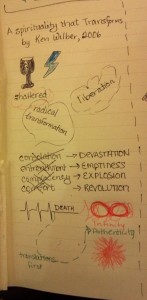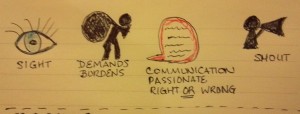Peter Buffet’s description of society’s perpetual poverty machine, reminiscent of John Perkins “we don’t need more non-profits”. Both point toward why I am (trying) to be exit the investment of my efforts in charity, give away, doing for and not with. I keep getting sucked back in — the needs are so great, there’s always a crisis, it’s easier because it requires little transformation of me or of the other, and there is certainly more companionship. Standing in Parker Palmer’s tragic gap between what is and what could be is challenging, and yet, for me, quite rewarding and absolutely necessary. Come stand with me?
Peter Buffet outlines the Charitable-Industrial Complex
Mixed Messages
Organizations are weird. Churches in particular. The mixed messages we send.
I attend worship with a congregation who laments that there are so few young families and children attending. “Oh, woe is us. We want a vibrant community. Somebody do something! Save us!”
You know those kids you want? They were in the building all week, learning about Habitat for Humanity. All those smiling faces were here, brimming over with laughter and wonder at the world. Squealing with delight during the wheelbarrow races in your sanctuary. Collecting over 500 quarters to donate for a new Habitat home. They ate chicken nuggets and pizza in your fellowship hall. Some of you know this. Some of you answered the call for volunteers: you prepared meals and fed them. Some of you led music and classes or shepherded them through their activities. Their joy became your joy!
We offered to share that joy with the congregation this morning. The sanctuary sported a banner of those kids’ hand prints, drawn and colored by those wiggly, squirmy, wonderful kids that you claim you so want to be in your community. Did you stop to read their names? Did you see the rainbow of colors in their artwork? Did you praise the Lord for bringing them into you building? Some of you did. And more than one of you complained because this banner impeded your shortest route for your social visit with musicians in the chancel.
You know those kids you want in your congregation? On Friday night, they were on your front lawn. In their swimsuits. Dancing and yelling and slipping and sliding at an improvised water park. Squirt guns and super soaker guns. Their young parents joining them in the fun pouring a few cups of water on unsuspecting spouses. Devouring 77 hot dogs while smearing ketchup ear to ear. Nibbling on carrots, then sneaking off to share that orange bounty with neighborhood rabbits. Sporting mustaches from cups of fruit punch and dribbling ice cream sandwiches down their chins. And laughing. And chasing. And running. So full of life and possibility and joy. Like it says on your signs at the edge of town: Come discover the joy.
All those little kids. AND their young parents.
On YOUR front lawn.
Where were you? Not a one of you was there.
Where were you, oh ye who beg to be saved? Where are you? Where will you be when the next call for volunteers goes out?
Wake up, folks. Wake up and save yourself. Wake up and you shall set yourselves free.
Seeking wholeness in a garden
http://www.washingtonpost.com/blogs/on-faith/wp/2013/07/31/what-grows-in-a-garden/
- “people of faith across the country who aren’t in the headlines but who are making love visible and are doing it in a garden.”
- “our desire for real food is bound up in our spiritual desire to be fed.”
- “a deeper hunger that drives us to consume even as our consumption fails to satisfy”
- “our passions and convictions need to first be formed in a place where we can glimpse that unbroken wholeness for which we all yearn”
Major projects:
- Ron Finley: A guerilla gardener in South Central LA (TED Talk) “If you want to meet, don’t call me if you want to sit around in cushy chairs where you talk about doing…. if you want to meet with me, come to the garden with your shovel….”
- LA Green Grounds
- Growing Power and Will Allen
- My subversive (garden) plot – Roger Doiron
- Incubator Farmers in Chicago
Recognizing Cultural Differences
How simple it can be to assume our own understanding of the world is the only understanding. Or the only right understanding. Understanding Your Host Culture is a good introduction. I think we would be wise to recognize that cultural differences arise in more than short-term mission trip experiences.
Time. What does time represent to you? For many in middle class America, time equals money and time is a scarce commodity. We think in hourly billing rates; how much can we produce; how much can we make; how many activities and assignment can we shove into our too short days? The article calls this perception of time “clock time”. Another perception of time is “event time”. For someone immersed in middle class America, this can be a difficult and frustrating concept. The closest I can come is the lazy days of summers of childhood. F. David Peat references event time in his understanding of Native American cultures; events begin when it’s time (but not determined by a clock). There seems to be a thread of this in the way the director of a gospel choir reads the feeling of the room to know whether to wrap up the song or continue. A Geography of Time by Robert Levine describes some critical research in understanding of how the understanding of time relates to poverty.
Respect. For many in middle class America, being “on time” is a sign of respect, while being late is disrespectful. In other areas, time is much more fluid.
Context. How much info do you need from context to fit in, to understand the processes? Do only insiders “get it”? Is it “because we’ve always done it that way?” I recall my first forays into a local congregation. I was determined to find out “how things worked”. The written documents were rarely the reality of life.
Individuality. Which has higher value: the needs of an individual or the needs of the group? How are decisions made? By vote, majority rules? Or by consensus?
Status levels. How revered are those in positions of power?
Risk taking/avoidance.
Transformation. Or not.
Barna’s Ten Stops Toward Maximum Faith.
Claims that the biblical path is leaping from 3 to 7.
3. Skipping 1 & 2 Concerned about the implications of personal sin.
4. Confess sins and ask Jesus Christ to be their Savior. 9 [I think this is a product of Christendom]
5. Commitment to faith activities.
6. Prolonged period of spiritual discontent.
7. Personal brokenness.
8. Choosing to surrender and submit fully: radical dependence. 1%
9. Enjoying a profound intimacy with and love for God. 0.5%
10. Experiencing a profound compassion and love for humanity. 0.5%
Voices
World Bank’s Voices of the Poor
- lack of material things such as food, money, clean water, medicine, housing ==> a place for handouts of money and material goods
- sense of shame, inferiority, powerlessness, humiliation, fear, hopelessness, social isolation, voicelessness ==> relationships that infuse lives with dignity and trust, those will walk beside them in true friendship, respect, honor, and equality
Dissent
http://www.benetvision.org/Ideas_In_Passing/03_11_13.html
- Dissent comes out of the depth of the heart and exists only in service to what both sides say that they are each committed to preserving.
- out of a soul in anguish over life that must be bartered in the process of saving it.
- always has a place and a time and a face we do not expect to see in this place and at this time.
- The problem is that both sides define their one same loyalty differently. The establishment is always loyal to the very institutionalism of the institution in question. The dissenter is always most loyal instead to what the institution itself claims to be about.
- loneliness is at the very heart of dissent
- Loneliness is its character and isolation is its cost
- the few who hold out against total dissolution of the highest ideals of any institution.
Planting People
Through the shadow by embracing vulnerability
http://www.panhala.net/archive/wild_geese.html
http://heatherplett.com/2013/03/you-do-not-have-to-be-good/
http://www.ted.com/talks/brene_brown_listening_to_shame.html
http://www.ted.com/talks/brene_brown_on_vulnerability.html
- “…when we our lose tolerance for vulnerability, joy becomes foreboding”
- Cultivating Gratitude and Joy
- gratitude is a practice
- “…in a culture of scarcity, we are all chasing the extraordinary…”
http://www.psychalive.org/2012/01/how-to-begin-again-from-wounds-to-wisdom-by-diane-renz-lp/
http://www.patheos.com/blogs/nadiabolzweber/2013/03/sermon-one-more-year-for-figs-and-crap/
Transformational Spirituality
My first  attempts at sketch noting while reading Ken Wilber’s A Spirituality That Transforms. I’m hooked!!!
attempts at sketch noting while reading Ken Wilber’s A Spirituality That Transforms. I’m hooked!!!
Wilber’s writings are just beyond my comprehension. Although I have some cognitive understanding, I know it is a shallow one. Through a glass darkly….
- Religion/spirituality as translation (horizontal, morphine-laced map [now THERE’s some fodder for a sketch note]); legitimacy, social glue
- Versus Spirituality as transformation (vertical, shattering, authenticity)
- Begin with helpful translations before transformation
- Inquire into the ego’s motive for seeking and desiring enlightenment
Sketch Note fun: http://thenounproject.com

